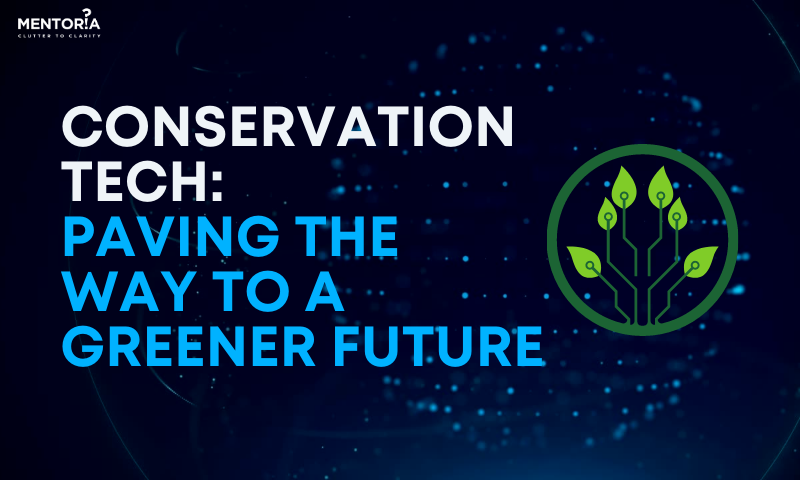Conservation Tech: Paving The Way To A Greener Future

Jump to Section
In a world grappling with environmental challenges, the need for innovative solutions has never been more pressing. Conservation technology, at the intersection of science, technology, and environmental stewardship, offers a ray of hope. From cutting-edge tools and software to groundbreaking research and sustainable practices, the field of conservation technology is revolutionising the way we approach environmental issues. In this blog, we will delve into the fascinating world of conservation technology, exploring the latest innovations and the diverse career paths it offers. Whether you’re an aspiring environmentalist, a technology enthusiast, or simply curious about the future of our planet, this blog will provide insights into the exciting possibilities that lie ahead. Join us as we discover the groundbreaking advancements and rewarding opportunities in conservation technology that are shaping a sustainable and resilient future for our planet.
The Power Of Drones: Revolutionising Environmental Monitoring
Drones are not just cool gadgets; they’re superheroes in the world of environmental monitoring! With their high-resolution cameras and advanced sensors, they provide us with a bird’s-eye view of our precious ecosystems. By tracking animal populations, monitoring migration patterns, and even sniffing out illegal activities like poaching, drones are helping us protect wildlife like never before. They also assess the health of ecosystems and pinpoint areas in need of conservation. Plus, careers in drone technology and aerial data analysis are soaring high! So, if you’ve ever dreamt of flying high while making a difference, this field offers opportunities as drone operators, data analysts, and GIS specialists. It’s time to take flight and be a superhero for the environment!
Sensing The Environment: The Role Of Sensor Technologies
When it comes to environmental monitoring, sensors are the real superheroes. These devices can detect and measure temperature, humidity, air, and water quality. They’re our secret weapon for tracking biodiversity, monitoring ecosystems, and detecting changes in environmental conditions. Sensors may seem like small and unassuming gadgets, but they hold immense power when it comes to protecting our environment. They act as environmental detectives, sniffing out pollutants in rivers and helping researchers and agencies take quick action to combat contamination. By collecting valuable data, sensors give us a deeper understanding of ecosystems, supporting conservation efforts, and guiding sustainable resource management. If you have a knack for deploying and maintaining sensor networks, analysing data, or developing innovative sensor solutions, a career in sensor technologies is your calling!
Big Data Analytics: Unveiling Insights For Conservation
We’re living in a time when data is abundant, and it’s transforming the way we approach conservation. By harnessing the power of big data analytics, researchers can unravel complex environmental patterns, identify trends, and develop predictive models. Big data analytics techniques allow researchers to analyse complex environmental data, identify patterns, and develop predictive models. For instance, data-driven models can aid in species tracking, ecological modelling, and predicting climate change impacts. Careers in this field involve expertise in data science, machine learning, and data visualisation. Data scientists, statisticians, and analysts play a crucial role in unlocking the hidden patterns within environmental datasets, enabling evidence-based conservation strategies.
Harnessing The Power Of Artificial Intelligence
Artificial intelligence (AI) has emerged as a transformative force in conservation technology. AI algorithms can process vast amounts of data, enabling automated species identification, predictive modelling, and anomaly detection. AI-powered tools can analyse camera trap images to identify and classify wildlife species, significantly reducing the time and effort required for manual analysis. Moreover, AI algorithms can process real-time data to detect unusual behaviour in animal populations, aiding in the prevention of wildlife crimes and the early detection of environmental threats. Careers in AI research, algorithm development, and conservation planning involve applying AI techniques to solve complex conservation challenges. Professionals in this field work on developing and implementing AI-driven solutions to enhance the efficiency and effectiveness of conservation efforts.
Technology For Sustainable Agriculture And Forestry
Conservation technology extends its impact beyond wildlife and habitat conservation to include sustainable agriculture and forestry practices. Innovations such as precision farming, smart irrigation systems, and remote sensing techniques enhance agricultural productivity while minimising environmental impact. Precision agriculture utilises technologies like GPS, drones, and sensor networks to optimise resource allocation, reduce pesticide use, and improve crop yields. In forestry, remote sensing and satellite imagery help monitor deforestation, assess forest health, and plan sustainable logging practices. Careers in sustainable agriculture and forestry involve expertise in technology integration, data analysis, and implementing precision farming and forestry techniques. Professionals in this field contribute to sustainable food production, minimise ecological footprints, and promote the responsible use of natural resources.
Citizen Science And Environmental Engagement
Citizen science initiatives have transformed the landscape of environmental research and conservation. Through technology, individuals from all walks of life can actively participate in data collection, monitoring, and environmental awareness campaigns. Mobile apps, online platforms, and crowdsourcing platforms allow citizens to contribute valuable data, such as bird sightings, water quality measurements, and biodiversity observations. Engaging with the public fosters environmental literacy, empowers communities, and creates a sense of ownership and responsibility towards nature. Careers in citizen science involve designing and implementing citizen science projects, developing user-friendly apps and platforms, and effectively communicating scientific findings to the public. Professionals in this field bridge the gap between science and society, mobilising collective action for environmental conservation.
Paving The Way To A Sustainable Future With Mentoria
And there you have it, the world of conservation technology awaits you with open arms and endless possibilities. If you’re ready to embark on a career that combines your passion for the environment with cutting-edge technology, Mentoria is here to guide you on your journey. Our experienced career counsellors can help you navigate the exciting field of conservation technology, providing personalised guidance and support to help you make a meaningful impact. So, don’t hesitate to reach out to Mentoria and take the first step towards a rewarding career in the intersection of technology and environmental conservation.










